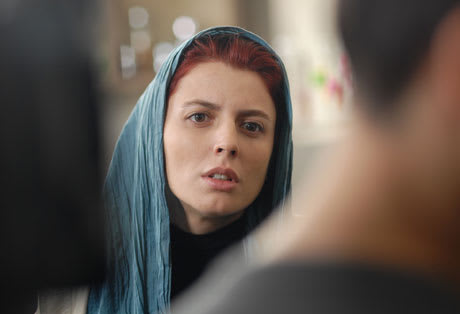It starts out simply enough, with Simin (Leila Hatami) seeking a divorce from Nader (Peyman Moaadi) so she can legally take her daughter, Termeh (Sarina Farhadi), abroad for a better life. The assumption is that we're about to examine the legalities and gender imbalances of modern Iran, as Nader refuses to leave behind his Alzheimer's stricken father, who requires constant surveillance.
But this is merely a setup. The next segment of award-winning Iranian film A Separation has Nader hiring pregnant housekeeper Razieh (Sareh Bayat) to take on the domestic responsibilities of his absent wife, partly keeping an eye on his father, whose tendency to wet the bed proves problematic for this woman's strict religious background.
Compounding the issue of religious doctrine is the fact that Razieh's husband is out of work, leaving her to multitask on the job, tying Nader's father to a bed while running an errand. Inevitably, this inhumanity is discovered, leading to a physical altercation and miscarriage on the part of Razieh.
From here, this exceedingly insightful and well-acted examination of human conflict runs on seeming autopilot, detailing the many stories, lies and perspectives of a dispute that escalates to the courts, threatening the futures of all involved. Each character has a personal investment in the scenario, inevitably lying, or exaggerating, to ensure their needs are fulfilled and future protected.
The many ways that everyone slyly manipulates and guilt trips each other, making up stories to further their agendas, is so uniquely entwined with the human condition on a universal level that you'd be hard-pressed to find someone that couldn't identify with, or find rage in, the complexities and plot developments unfolding.
True, Asghar Farhadi has the occasional conservative criticism of modernity and an overly convoluted, easily exploited legal system, but what we have here is a sharp and incisive drama about the very core of human fallibility.
Quite frankly, there isn't a single moment of this exceptionally well-assembled and intelligent critique of humanity that doesn't ring true and naturalistic.
When Nader puts the weight of his future on the shoulders of daughter Termeh, saying, "I'll tell the truth, if it will make you feel better, even if it means I go to jail for three years and you're left without a father," we understand the veiled emotional weight of his statement and what it means to a young girl conflicted by ideals and reality.
(Mongrel Media)But this is merely a setup. The next segment of award-winning Iranian film A Separation has Nader hiring pregnant housekeeper Razieh (Sareh Bayat) to take on the domestic responsibilities of his absent wife, partly keeping an eye on his father, whose tendency to wet the bed proves problematic for this woman's strict religious background.
Compounding the issue of religious doctrine is the fact that Razieh's husband is out of work, leaving her to multitask on the job, tying Nader's father to a bed while running an errand. Inevitably, this inhumanity is discovered, leading to a physical altercation and miscarriage on the part of Razieh.
From here, this exceedingly insightful and well-acted examination of human conflict runs on seeming autopilot, detailing the many stories, lies and perspectives of a dispute that escalates to the courts, threatening the futures of all involved. Each character has a personal investment in the scenario, inevitably lying, or exaggerating, to ensure their needs are fulfilled and future protected.
The many ways that everyone slyly manipulates and guilt trips each other, making up stories to further their agendas, is so uniquely entwined with the human condition on a universal level that you'd be hard-pressed to find someone that couldn't identify with, or find rage in, the complexities and plot developments unfolding.
True, Asghar Farhadi has the occasional conservative criticism of modernity and an overly convoluted, easily exploited legal system, but what we have here is a sharp and incisive drama about the very core of human fallibility.
Quite frankly, there isn't a single moment of this exceptionally well-assembled and intelligent critique of humanity that doesn't ring true and naturalistic.
When Nader puts the weight of his future on the shoulders of daughter Termeh, saying, "I'll tell the truth, if it will make you feel better, even if it means I go to jail for three years and you're left without a father," we understand the veiled emotional weight of his statement and what it means to a young girl conflicted by ideals and reality.




